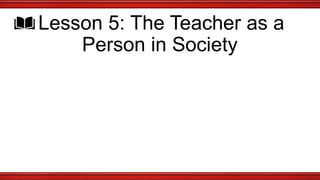This document discusses the role and responsibilities of teachers. It defines key concepts like morality and ethics. Teachers are expected to act morally and serve as role models for students. Their duties include teaching subjects, managing student behavior, and helping students develop skills and values. Teachers also take on roles like mentors, counselors, and surrogate parents. They must work to strengthen relationships between the school and community.


































































